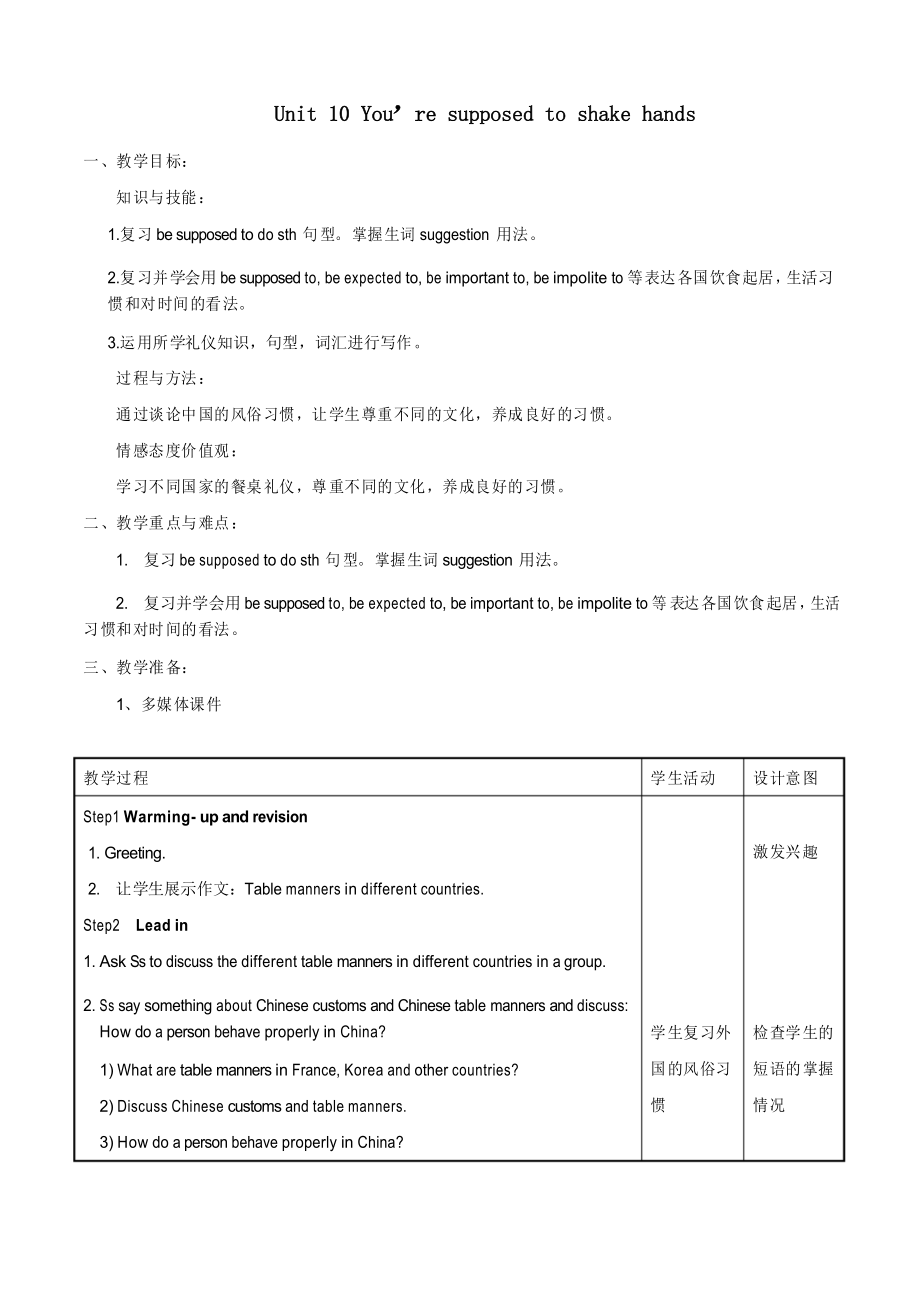《人教版九年級(jí)英語下冊Unit 10 Section B(3a-Self Check)教案》由會(huì)員分享�,可在線閱讀,更多相關(guān)《人教版九年級(jí)英語下冊Unit 10 Section B(3a-Self Check)教案(5頁珍藏版)》請(qǐng)?jiān)谘b配圖網(wǎng)上搜索�����。
1�、
Unit 10 You’re supposed to shake hands
一、教學(xué)目標(biāo):
知識(shí)與技能:
1.復(fù)習(xí) be supposed to do sth 句型�����。掌握生詞 suggestion 用法。
2.復(fù)習(xí)并學(xué)會(huì)用 be supposed to, be expected to, be important to, be impolite to 等表達(dá)各國飲食起居�����,生活習(xí) 慣和對(duì)時(shí)間的看法�����。
3.運(yùn)用所學(xué)禮儀知識(shí)�����,句型�����,詞匯進(jìn)行寫作�。
過程與方法:
通過談?wù)撝袊娘L(fēng)俗習(xí)慣����,讓學(xué)生尊重不同的文化,養(yǎng)成良好的習(xí)慣���。
情感態(tài)度價(jià)值觀:
2�、學(xué)習(xí)不同國家的餐桌禮儀,尊重不同的文化���,養(yǎng)成良好的習(xí)慣�。
二�、教學(xué)重點(diǎn)與難點(diǎn):
1. 復(fù)習(xí) be supposed to do sth 句型。掌握生詞 suggestion 用法����。
2. 復(fù)習(xí)并學(xué)會(huì)用 be supposed to, be expected to, be important to, be impolite to 等表達(dá)各國飲食起居,生活 習(xí)慣和對(duì)時(shí)間的看法���。
三��、教學(xué)準(zhǔn)備:
1�����、多媒體課件
教學(xué)過程
Step1 Warming- up and revision
1. Greeting.
2. 讓學(xué)生展示作文:Table
3��、manners in different countries.
Step2 Lead in
1. Ask Ss to discuss the different table manners in different countries in a group.
2. Ss say something about Chinese customs and Chinese table manners and discuss: How do a person behave properly in China?
1) What are table manners in France
4�、, Korea and other countries?
2) Discuss Chinese customs and table manners.
3) How do a person behave properly in China?
�
學(xué)生活動(dòng)
學(xué)生復(fù)習(xí)外
國的風(fēng)俗習(xí)
慣
�
設(shè)計(jì)意圖
激發(fā)興趣
檢查學(xué)生的
短語的掌握
情況
教學(xué)過程
Step3 Presentation
Work on 3a.
1. Your pen pal is coming to China on an exchange
5����、 program. He/She is asking you
about Chinese customs and what he/she is supposed to do or not. Make notes in the chart.
�
學(xué)生活動(dòng)
學(xué)生通過
討論后�,自
己動(dòng)手完
成表格
�
設(shè)計(jì)意圖
Table manners
House rules
Going out with people
�
It’s polite/impolite to…
You’re supposed/not supposed to… You
6���、 should…
�
提醒學(xué)生
必須用上定
語從句
2. Fill in the chart and say the Chinese customs in English. Chinese customs
Table manners
?
?
?
?
?
?
?
�
It’s polite to ask older people to start eating first at the table. It’s not polite to pick up your bowl to eat.
You’re sup
7�����、posed to use chopsticks to eat.
It’s not polite to stick your chopsticks into your food.
It’s impolite to point at anyone with your chopsticks.
It’s impolite to knock your empty bowl with your chopsticks. …
House rules
◆ You’re supposed to greet the host family.
◆ You’re supposed
8、 to shake hands with people. ◆ You’re supposed to say “nihao” to people.
◆ You’re not supposed to bow, kiss or hug with people. ◆ …
Going out with people
?
?
?
�
You should call first.
You should make a going-out plan with friends. …
教學(xué)過程
Step4 Writing
Work on 3b.
9��、
1. Write a letter to your pen pal to give him/her advice and suggestions on how to behave properly in China.
2. 寫作技巧點(diǎn)撥:
1) 英語書信的寫法:
稱呼 Dear…���, 左起頂格寫��。
正文換行�����,也要頂格寫�,是信的核心部分�。因此要求正文層次分明、簡單易懂��。
祝福的話語, 正文下?lián)Q行�,頂格寫, 如: Best wishes! Take care! Happy New Year! Happy Birthday! 等��。
結(jié)束語在正文下面的一�����、二行處
10��、����,第一個(gè)詞開頭要大寫,句末用逗號(hào)�。結(jié)束語
的寫法 Yours, Your loving…, Sincerely yours、Yours sincerely 或 Sincerely�����;在 結(jié)尾語下面的署名必須親自簽名��,也不加任何的標(biāo)點(diǎn)符號(hào)�����。
2) Useful expressions:
有關(guān)文化禮儀的寫作常用句型
You’re (not) supposed to….
You are expected to…
It’s polite/impolite to…
It’s important to…
You should….
3. Give Ss a
11、n example:
Dear Tony,
You must be excited about coming to China soon. Let me give you some
suggestions and advice about Chinese customs. When you are eating at the table,
it’s impolite to stick your chopsticks into your food. You are not supposed to
point at anyone with your chopstick
12����、s. In our house, you’re supposed to shake hands
with my father for the first time. You are not supposed to kiss when you meet my mother. You can say hello to her with a big smile. When you go out with people,
�
學(xué)生活動(dòng)
學(xué)生自己寫
出一篇小的
短文之后,
在組內(nèi)互相
批改
學(xué)生做自我
檢測題
�
設(shè)計(jì)意圖
讓學(xué)生注意
13�、信的格式
鼓勵(lì)交流
培養(yǎng)良好的
復(fù)習(xí)習(xí)慣。
教學(xué)過程
you are expected to call first, it’s importantmaketo plans to do something interesting or go somewhere together.
Have a safe trip and I look forward to meeting you soon.
Best wishes!
Lin Jie
Step6 Self Check
Work on Self Check 1:
1. Let
14��、 some Ss read the words in the box. Make sure all the Ss know the meaning of the words.
2. Let Ss read the sentences in Self Check 1. Then Ss try to fill in the blanks with the correct forms of the words in the box.
worth capital basic traffic empty mad
knocking
1) In many countries, it
15����、is impolite to show up at someone’s house for the first time with ______ hands. You should always bring a small gift.
2) Billy was very uncomfortable at a fine-dining restaurant last night because he didn’t know ______ table manners.
3) It is _______ spending the time to learn about the custom
16、s of a country before
you go there. That way, you will know what you are supposed to do in different situations.
4) The ______ is always the worst in the ________ city. It is important to leave earlier if you are traveling by car.
5) Sandy went into her sister’s room without _________ on th
17����、e door. That made her sister ______.
3. Let some Ss read their answers. Check the answers with the Ss.
Keys: empty, basic, worth, traffic, capital, knocking, mad
Work on Self Check 2
1. Tell Ss that they have to complete the statements below. They should write
�
學(xué)生活動(dòng)
學(xué)生做自我
檢測題
�
18���、
設(shè)計(jì)意圖
檢查學(xué)習(xí)的
情況
教學(xué)過程
sentences about the customs with “ be (not) supposed to, be expected to, be polite/impolite to”.
2. Ss think and try to complete the statements by themselves.
In my culture, when you…,
you’re supposed to ____________
you’re not supposed to _________
19����、
you’re expected to _____________
it’s impolite to ________________
it’s important to ______________
3. Let some Ss read their sentences to the class.
4. Correct the mistakes they have.
Step 6 Summary
1.be supposed to do sth 句型����。掌握生詞 suggestion 用法��。
2. 學(xué)會(huì)用 be supposed to, be expe
20��、cted to, be important to, be impolite to 等表達(dá)各 國飲食起居���,生活習(xí)慣和對(duì)時(shí)間的看法。
Step7Homework
1. Write a letter to your friend.
2. 編寫一份手抄報(bào)�����。
把收集到的各國見面禮儀��,餐桌禮儀��,風(fēng)俗習(xí)慣等信息制成一份手抄報(bào)���。
�
學(xué)生活動(dòng)
�
設(shè)計(jì)意圖
板書設(shè)計(jì)
Unit10 You are supposed to shake hands.
1. be supposed to, be expected to, be important to, be impolite to 句型����。 2. 了解各國的各國飲食起居���,生活習(xí)慣和對(duì)時(shí)間的看法����。
 人教版九年級(jí)英語下冊Unit 10 Section B(3a-Self Check)教案
人教版九年級(jí)英語下冊Unit 10 Section B(3a-Self Check)教案

